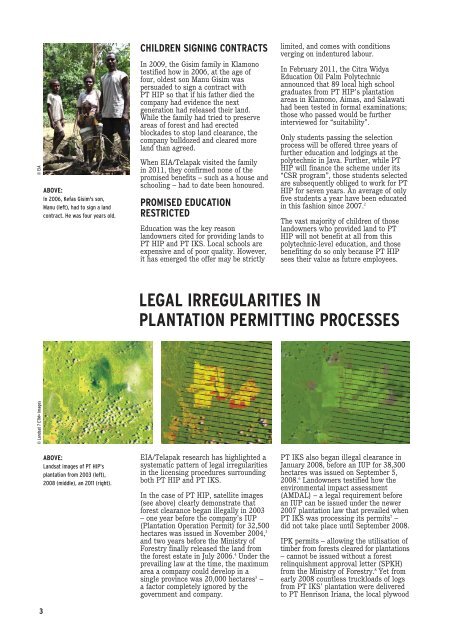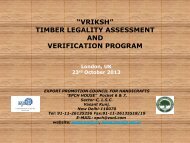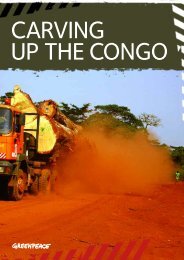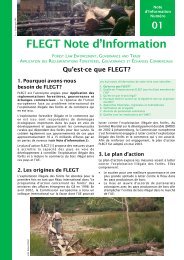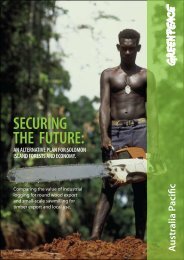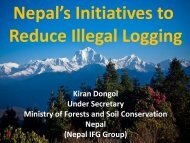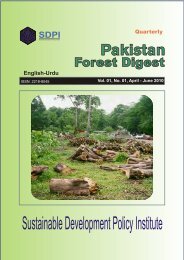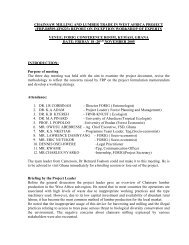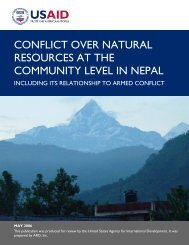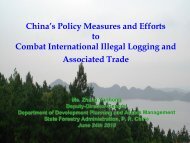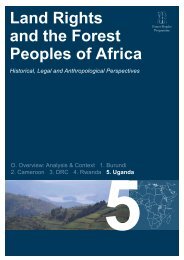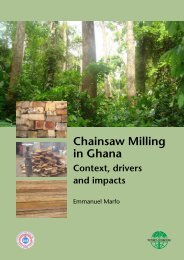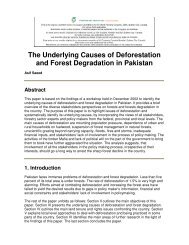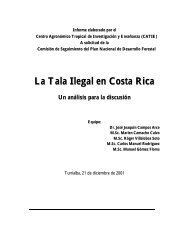CLEAR-CUT EXPLOITATION - Environmental Investigation Agency
CLEAR-CUT EXPLOITATION - Environmental Investigation Agency
CLEAR-CUT EXPLOITATION - Environmental Investigation Agency
Create successful ePaper yourself
Turn your PDF publications into a flip-book with our unique Google optimized e-Paper software.
© EIA<br />
ABOVE:<br />
In 2006, Kefas Gisim's son,<br />
Manu (left), had to sign a land<br />
contract. He was four years old.<br />
CHILDREN SIGNING CONTRACTS<br />
In 2009, the Gisim family in Klamono<br />
testified how in 2006, at the age of<br />
four, oldest son Manu Gisim was<br />
persuaded to sign a contract with<br />
PT HIP so that if his father died the<br />
company had evidence the next<br />
generation had released their land.<br />
While the family had tried to preserve<br />
areas of forest and had erected<br />
blockades to stop land clearance, the<br />
company bulldozed and cleared more<br />
land than agreed.<br />
When EIA/Telapak visited the family<br />
in 2011, they confirmed none of the<br />
promised benefits – such as a house and<br />
schooling – had to date been honoured.<br />
PROMISED EDUCATION<br />
RESTRICTED<br />
Education was the key reason<br />
landowners cited for providing lands to<br />
PT HIP and PT IKS. Local schools are<br />
expensive and of poor quality. However,<br />
it has emerged the offer may be strictly<br />
limited, and comes with conditions<br />
verging on indentured labour.<br />
In February 2011, the Citra Widya<br />
Education Oil Palm Polytechnic<br />
announced that 89 local high school<br />
graduates from PT HIP’s plantation<br />
areas in Klamono, Aimas, and Salawati<br />
had been tested in formal examinations;<br />
those who passed would be further<br />
interviewed for “suitability”.<br />
Only students passing the selection<br />
process will be offered three years of<br />
further education and lodgings at the<br />
polytechnic in Java. Further, while PT<br />
HIP will finance the scheme under its<br />
“CSR program”, those students selected<br />
are subsequently obliged to work for PT<br />
HIP for seven years. An average of only<br />
five students a year have been educated<br />
in this fashion since 2007. 2<br />
The vast majority of children of those<br />
landowners who provided land to PT<br />
HIP will not benefit at all from this<br />
polytechnic-level education, and those<br />
benefiting do so only because PT HIP<br />
sees their value as future employees.<br />
LEGAL IRREGULARITIES IN<br />
PLANTATION PERMITTING PROCESSES<br />
© Landsat 7 ETM+ Images<br />
3<br />
ABOVE:<br />
Landsat images of PT HIP's<br />
plantation from 2003 (left),<br />
2008 (middle), an 2011 (right).<br />
EIA/Telapak research has highlighted a<br />
systematic pattern of legal irregularities<br />
in the licensing procedures surrounding<br />
both PT HIP and PT IKS.<br />
In the case of PT HIP, satellite images<br />
(see above) clearly demonstrate that<br />
forest clearance began illegally in 2003<br />
– one year before the company’s IUP<br />
(Plantation Operation Permit) for 32,500<br />
hectares was issued in November 2004, 3<br />
and two years before the Ministry of<br />
Forestry finally released the land from<br />
the forest estate in July 2006. 4 Under the<br />
prevailing law at the time, the maximum<br />
area a company could develop in a<br />
single province was 20,000 hectares 5 –<br />
a factor completely ignored by the<br />
government and company.<br />
PT IKS also began illegal clearance in<br />
January 2008, before an IUP for 38,300<br />
hectares was issued on September 5,<br />
2008. 6 Landowners testified how the<br />
environmental impact assessment<br />
(AMDAL) – a legal requirement before<br />
an IUP can be issued under the newer<br />
2007 plantation law that prevailed when<br />
PT IKS was processing its permits 7 –<br />
did not take place until September 2008.<br />
IPK permits – allowing the utilisation of<br />
timber from forests cleared for plantations<br />
– cannot be issued without a forest<br />
relinquishment approval letter (SPKH)<br />
from the Ministry of Forestry. 8 Yet from<br />
early 2008 countless truckloads of logs<br />
from PT IKS’ plantation were delivered<br />
to PT Henrison Iriana, the local plywood


